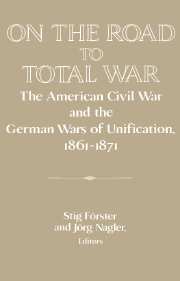Book contents
- Frontmatter
- 1 Introduction
- Part One Basic Questions
- Part Two Nationalism, Leadership, and War
- Part Three Mobilization and Warfare
- Part Four The Home Front
- 16 Loyalty and Dissent: The Home Front in the American Civil War
- 17 “The Better Angels of Our Nature”: Lincoln, Propaganda, and Public Opinion in the North during the Civil War
- 18 The Permanence of Internal War: The Prussian State and its Opponents, 1870-71
- 19 French Public Opinion in 1870-71 and the Emergence of Total War
- 20 Women and War in the Confederacy
- 21 German Patriotic Women's Work in War and Peace Time, 1864-90
- Part Five The Reality of War
- Part Six The Legacy
- Part Seven Conclusions
- Index
17 - “The Better Angels of Our Nature”: Lincoln, Propaganda, and Public Opinion in the North during the Civil War
Published online by Cambridge University Press: 05 January 2013
- Frontmatter
- 1 Introduction
- Part One Basic Questions
- Part Two Nationalism, Leadership, and War
- Part Three Mobilization and Warfare
- Part Four The Home Front
- 16 Loyalty and Dissent: The Home Front in the American Civil War
- 17 “The Better Angels of Our Nature”: Lincoln, Propaganda, and Public Opinion in the North during the Civil War
- 18 The Permanence of Internal War: The Prussian State and its Opponents, 1870-71
- 19 French Public Opinion in 1870-71 and the Emergence of Total War
- 20 Women and War in the Confederacy
- 21 German Patriotic Women's Work in War and Peace Time, 1864-90
- Part Five The Reality of War
- Part Six The Legacy
- Part Seven Conclusions
- Index
Summary
It is no longer possible to believe in the original dogma of democracy: that the knowledge needed for the management of human affairs comes up spontaneously from the human heart. Where we act on that theory we expose ourselves to self-deception, and to forms of persuasion that we cannot verify.
Walter LippmanWe approach the fifty-first election in our nation's history. As with the fifty that preceded it, the election is a defining moment. We will once again discover who we are and what we stand for. But we need to recognize that such definitions do not simply emerge spontaneously - they are created by men and women who tell us who we are and what our ideals should be. It is important that we have the best instruction possible. To discover what that might be, I want to talk about the fundamental aspect of that instruction - propaganda, the shaping of public opinion. My focus is the efforts of Northerners to shape public opinion during the Civil War era. I want to do four things here: (1) to explain the value of talking about propaganda in the Civil War era; (2) to define the term and place that definition within the context of American society; (3) to show how Northern opinion makers propagandized during the war; and, most importantly, (4) to discuss Abraham Lincoln, who deserves much more than any recent American leader the term “The Great Communicator.” I argue that Lincoln was self-consciously a propagandist and that, although his activities in that realm occasionally revealed a dark side, he ultimately provided propaganda that shaped an American society that was far better able to achieve its goals than it had been.
- Type
- Chapter
- Information
- On the Road to Total WarThe American Civil War and the German Wars of Unification, 1861–1871, pp. 357 - 376Publisher: Cambridge University PressPrint publication year: 1997
- 1
- Cited by

